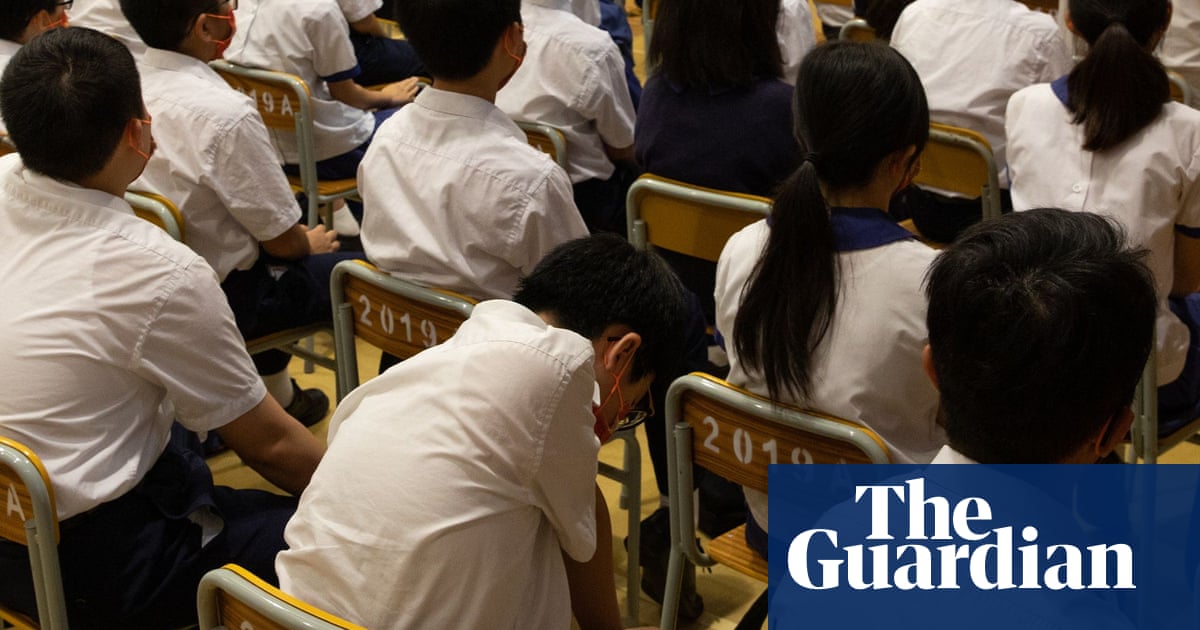Teachers inHong Konghave been warned to keep themselves and students away from any US Independence Day celebrations as they may breach national security laws, educators have alleged.
A text message purportedly sent by the principal of a Hong Kong school to staff said the education bureau’s regional education office had reminded them “to be careful about Independence Day activities organised by the US consulate in Hong Kong, and not to participate to avoid violating the national security law and Hong Kong laws”.
The text was published on Edu Lancet, a Facebook page run by a former manager at the Hong Kong Examinations and Assessment Authority, Hans Yeung. It urged staff to be diligent in “protecting” any students who were considering participating, and to discourage them.
Another email shared on Edu Lancet, and seen independently by the Guardian, told faculty staff that any teacher who received an invitation from an embassy or a foreign organisation funded by an embassy must seek permission to attend from the principal for the purpose of “maintaining national security”.
The Hong Kong education bureau did not confirm or deny the claims in response to questions from the Guardian, but in a statement said it had enacted policies to help schools “effectively prevent and suppress acts and activities that endanger or are detrimental to national security.
“Schools have the responsibility to play a good gatekeeper role and to enhance the sensitivity of teachers and students to national security.”
The bureau had enacted “clear guidelines” for schools that required them to “establish school-based mechanisms and formulate appropriate measures, according to their own circumstances and needs, to implement various tasks related to safeguarding national security and national security education”, it added.
The bureau did not answer questions about what laws would be broken by attending any Fourth of July event, or whether such warnings only applied to the US holiday.
The US Consulate in Hong Kong has been contacted for comment.
Edu Lancet and Yeung, who runs the page to voice concerns from those working with the education system and “expose the current problems”, have been criticised by the Hong Kong government in the past for their posts. The security secretary, Chris Tang, has accused Yeung of “making incitements” from his current home in the UK.
The purported directives fit in with tightening restrictions on Hong Kong’s education system, and a push to have the curriculum focus more on national security amid increased control of the city by the Chinese government. After pro-democracy protests rocked the city in 2019, the ruling Chinese Communist party imposed a national security law on Hong Kong that broadly outlawed acts of dissent and opposition as violations against the state.
In 2020, the then chief executive, Carrie Lam,blamed the education systemfor fuelling the protests, setting the tone for an overhaul that is ongoing.
The Hong Kong governmenthas since alteredtheschool curriculumto includeteachings on national securityin subjects such asEnglish language, music, maths and sport, and to focus more onpatriotic education. It has also banned texts it sees as endangering national security, including a picture book about sheep created by the city’s physiotherapists union,and prosecuted authors.
Teachers in Hong Kong have previouslytold the Guardianthey felt pressure to self-censor for fear of being reported for remarks seen as unpatriotic. Since the start of the 2023-24 school year, all new teachers in public sector schools, direct subsidy scheme schools and kindergartens must sit an exam on Hong Kong’s mini constitution, the Basic Law, and the national security law.
Hong Kong’s education minister, Christine Choi, hasrepeatedly warned of “soft resistance” in schools, and this month said educators had to be vigilant against the infiltration of “hostile forces” through events such as book fairs and extracurricular activities which “could include undesirable reading materials”.
Additional reporting by Jason Tzu Kuan Lu
